“Sometimes you just have decide to do it! Stop calculating, stop strategizing, follow your heart and soul and without doubt your enthusiasm will overcome all the risk analyses and doubt formulated by those who have only an interest in the status quo.” wrote Dr. Gunter Pauli on his twitter account before attending to event co-organized by the China Biodiversity Conservation and Green Development Foundation (CBCGDF) that took place June 25th 2018.


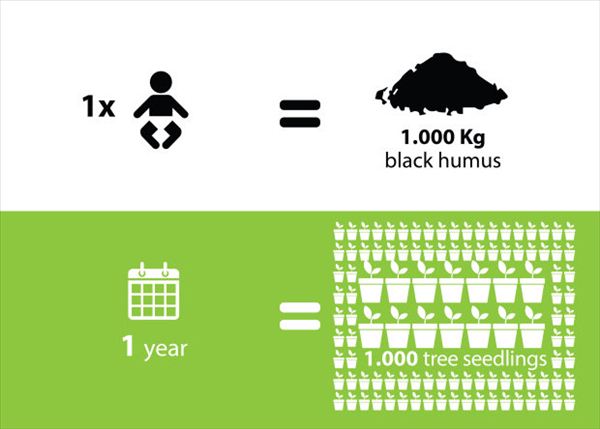
The man was invited by Dr. Jinfeng Zhou, Secretary General of CBCGDF and considered as a Chinese “living legend” to deliver a speech for CBCGDF, a leading NGO in China which takes an innovative approach towards environmental protection and sustainable development.

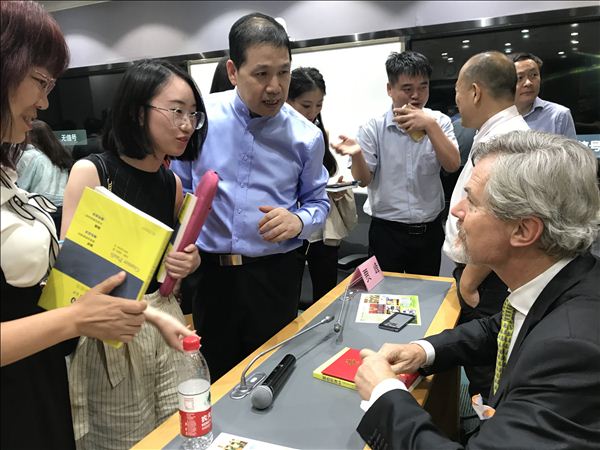
Born in Belgium in 1956, the man called by western media as the “Steve Jobs of sustainable development” is primarily an entrepreneur. After graduating in economic sciences from the University of Antwerp (Belgium), he then obtained masters from INSEAD business school (France) and from the Polytechnic University of Turin (Italy). Simultaneously, the first company he created in 1981 in Tokyo was a total success. At the age of 25, the businessman became a pioneer in the import/export market of Belgian products to Japan. In 1992, he was nominated Young Global Leader during the World Economic Forum (WEF) and, in 1993, as one of the ten most remarkable entrepreneurs by the Junior Chamber International (JCI). Today, he owns and chairs a dozen companies centered on culture, politics, science, and ecology. However, it is because of his sheer love for sustainable development that Dr. Gunter Pauli became the person he is today.
By integrating the famous Club of Rome, Dr. Gunter Pauli was rapidly initiated to global issues. He indeed told the Belgian press that when he met Aurelio Peccei, former CEO of Fiat and one the founders of the Club of Rome, he knew he would always stay an independent entrepreneur and combine environment, innovation and entrepreneurship. A state of mind which lead him to purchase Ecover, a Belgian environment-friendly cleaning products company that ran into financial difficulties in the 1990s, and to build the world’s first biodegradable factory in 1991.
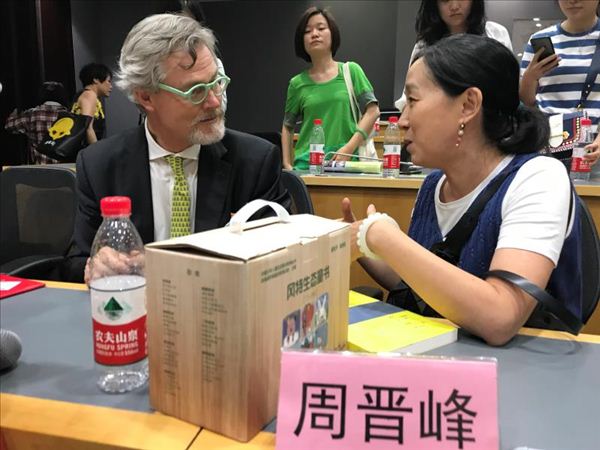
During the first minutes of his speech at the CBCGDF conference, he explained how his factory efficiently and easily combines ecology: “I have 100 workers, no cars. There are no cars because I pay the workers half a dollar per mile to ride a bicycle to work. Everyone comes on a bicycle!” and economy: “And people say this may be expensive. Do you know how much it costs, 100 parking places? You need to buy a land, you need to pave it, you need to have a gate going in and out, you need security… all that cost equals half a dollar per mile to ride a bicycle to work!”. He then ironically asserted: “They don’t teach this economic model in business schools”. Dr Gunter Pauli also outlined the human side of his factory: “This is the roof of my factory. I invite every distributor of my products to plant a flower on the roof.” He later added: “Too much business no heart.”
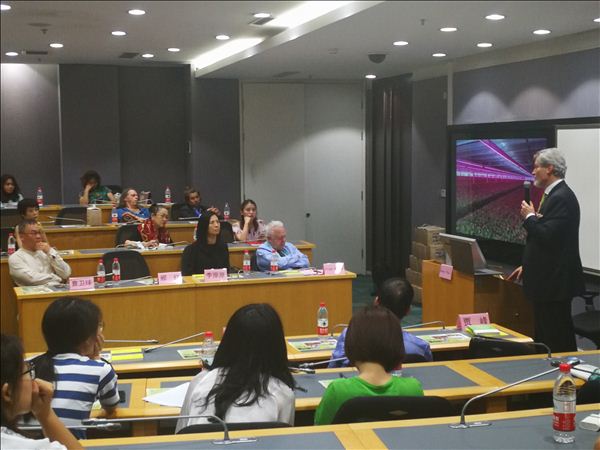
To the many environmental issues the world is facing today, Dr. Gunter Pauli offers concrete solutions with the idea that waste is always beneficial. The founder of the Blue Economy principle shared with us its philosophy: “Do not expect Earth to produce more. Do more with what the Earth produces”. In 1994, the businessman created Zero Emissions Research Initiatives (ZERI), a foundation seeking for sustainable solutions inspired by nature: “It is not learning about nature, It’s learning from nature”, Dr. Pauli said. Throughout his speech, we learned that a cup of coffee only contains 0.2% of the biomass of the red cherries harvested and that 99.8% could be used as substrate to grow up mushrooms, the rest, enriched with amino-acids, may then be composted by worms.
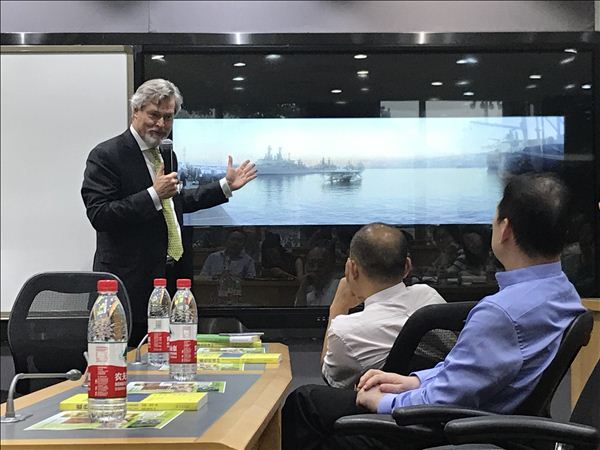
China being one of the biggest consumers of diapers, another surprising solution is the creation of biodegradable diapers made of bamboo cellulose that are 100% compostable. They are turned into black soil (Terrapreta) which is used to plant fruit trees on it. A few years later, fruits are ready to be harvested and eaten, forming a perfect cycle as everything is reused. The project was tested in Germany and received a one million euro price for the best business design and, once again, it combined ecology and economy. Indeed, at the CBCGDF conference, Dr. Gunter Pauli said: “In one year the baby produces one ton of waste. We turn it into one ton of black soil. One ton of black soil is enough for 1000 fruit trees. After ten years, one tree gives 50 kilos of fruits.” Before adding once again ironically “They don’t teach this in business schools.” Dr. Gunter Pauli demonstrated that coffee and dirty diapers are waste that, just like in nature, could always be reused.
Although Dr. Gunter Pauli is an enthusiastic blue environmentalist as he calls himself, he is very disappointed with the traditional green environmentalists. As a matter of fact, he told France24 and the Mauritian press that green environmentalists still have an old-fashioned mentality that needs to be updated. According to him, green environmentalists defend causes that are not worth defending anymore: “Pandas we are saving are not going to save the world. […] For me, the only logic ecology should follow is the regeneration of ecosystems and getting nature on the evolutionary track”. At Monday’s CBCGDF conference, he expressed indignation towards Greenpeace “There has never been a Greenpeace campaign against coffee drinkers. Coffee drinkers are bad, they pollute a lot.” He also criticized the Paris agreement that has two exceptions: the maritime sector and the industry of internet.
It may seem clear that Dr. Gunter Pauli is an innovator. Committed to turn dreams to vision and reality, the speech he gave at the CBCGDF conference last Monday left everyone contended and amazed by the clarity and simplicity with which he speaks. Also, the role and context of this conference cannot be underestimated. As CBCGDF will continue to take action in order to raise awareness about environmental issues, the Chinese Ministry of Ecology and Environment said late on Monday that China will comprehensively strengthen environmental protection and reduce air pollution so as to achieve overall improvement in ecological quality.
We may also thank the Center for Education and Communications of Ministry of Environment Protection who guided this event; and the Strategic Institute of Peking University for hosting this event as well as the Peking University Alumni Association, the Tsinghua University "Belt and Road" initiative research institute, Tsinghua University "Belt and Road" Health Development Research Center, 1898 Cafe, and Shanghai Muyi Investment Consulting Co., Ltd for having co-organised the event.
Author/Eddy Mayar Ariss Editor/Linda Wong


